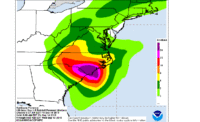Federal agencies are continuing to provide disaster-relief funds to states recovering from this year’s storms and floods, including Hurricane Matthew. But Louisiana says it needs additional aid.
 The Housing and Urban Development Dept. on Oct. 13 awarded Louisiana $437.8 million to help rebuild after August and March flooding. Gov. John Bel Edwards (D) welcomed HUD’s grants but said Louisiana’s need is much larger. He asked President Obama for an additional $4 billion for repairs and recovery.
The Housing and Urban Development Dept. on Oct. 13 awarded Louisiana $437.8 million to help rebuild after August and March flooding. Gov. John Bel Edwards (D) welcomed HUD’s grants but said Louisiana’s need is much larger. He asked President Obama for an additional $4 billion for repairs and recovery.
Congress must approve any new relief aid. Lawmakers won’t be back in session until after the Nov. 8 election. But in the postelection session, the House and Senate must approve further appropriations to keep most federal agencies open deeper into fiscal year 2017. That expected spending measure could be a vehicle for more disaster-relief aid for Louisiana as well as relief funds for southeast states hammered in October by Hurricane Matthew.
Congress must act on the spending bill by Dec. 9, when a stopgap measure expires.
Edwards, citing updated cost estimates, made Louisiana’s new request in an Oct. 20 letter to Obama. Edwards said the $4 billion includes $3.3 billion in HUD grants beyond those awarded in October. On Sept. 12, he asked Obama for a total of $2.8 billion in HUD grants. In his new letter, Edwards said Louisiana’s current estimate of unmet needs for owner-occupied housing is $2.8 billion. He noted that, in some localities, 80% of the homes suffered flood damage. He also is seeking $39 million in Federal Highway Administration (FHWA) emergency funds for road and bridge repairs.
Still, Louisiana should be able to put its newly awarded $437.8 million in HUD grants to use soon. HUD said the aid can go for a wide range of purposes, including redeveloping housing, aiding businesses and repairing infrastructure.
Congress provided the $500 million in the current stopgap spending package, enacted on Sept. 29. Besides Louisiana’s $437.8 million, Texas got $45.2 million and West Virginia received $17 million. In the legislation, lawmakers directed that the $500 million go to “the most impacted and distressed areas” hit by natural disasters from Jan. 1 to Sept. 29, 2016.
HUD said it used Federal Emergency Management Agency data outlining the greatest amount of “unmet housing need.” It determined that such areas included six counties in Louisiana, three in Texas and two in West Virginia. HUD Secretary Julián Castro said in a statement that Louisiana, Texas and West Virginia “experienced intense and destructive flooding, causing great damage to residents’ homes and draining state resources.”
Meanwhile, more federal funds are moving to states affected by Hurricane Matthew. South Carolina on Oct. 20 received $1 million in FHWA emergency-relief funds to help start critical repairs to roads, highways and bridges. FHWA said 13 South Carolina counties have widespread transportation damage. Administrator Gregory Nadeau said the funds are a first installment of post-hurricane funds to the state. The South Carolina Dept. of Transportation on Oct. 25 reported that highway and bridge closures had dropped to 57. That compares with the Oct. 10 peak of 481 closures.
South Carolina’s funding follows $5 million that the FHWA sent to North Carolina on Oct. 12 for post-Matthew repairs. The state’s Dept. of Public Safety on Oct. 25 said half the 600 roads closed by the storm have been reopened, and three more counties have been declared eligible for FEMA disaster assistance, bringing the total to 31, out of the state’s 100 counties.




